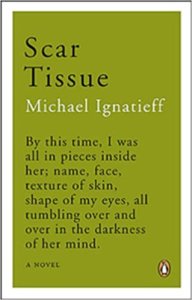I’ve just finished Michael Ignatieff’s 1993 novel Scar Tissue. It’s on Andrea Charise’s “Aging and the Arts” course list (see previous post), and concerns two brothers and their mother’s memory loss and death. One brother, a doctor/researcher, responds clinically; the other, the narrator, a philosophy professor, submerges himself deeply — at the cost of his family — into all the conundrums of selfhood that loss of self in Alzheimer’s and dementias involve. An ideal book for a class, I thought, so much here to resonate with, wrestle with, discuss. 
Ignatieff is a good writer. I remember how I savoured his nonfiction The Russian Album many years ago. (“Reminiscent of our Mennonite past,” my friend Sarah Klassen said, recommending it.) Scar Tissue didn’t work for me as well, not as a novel, that is. The characters never quite transcended diverse positions around the dilemmas of neurological illness. (“I began to think my mother as a philosophical problem,” the narrator says). I wished Ignatieff had mused on stoicism, the relation between selfhood and memory, the difference between giving up and letting go, etc., with the more compelling integrity of memoir. (After all, the book grew out of his own mother’s Alzheimer’s disease.)
What haunts me in Scar Tissue, though, is the narrator’s stark and subterranean fear, the mother’s illness “passed from cell to cell…the dark starbursts of scar tissue [in the brain]…the inheritance,” taking hold also within him by the end. I recognize that fear. But haunting too is a curious beauty when this “form of dying in which everything familiar becomes strange” is done, plus the vision of some kind of wondrous illumination/knowledge possible even within the blinding journey itself. That felt almost optimistic.

This is a topic that haunts us all to some degree as we get to a certain age. We can wrestle with it or ignore it, but it’s not going away any time soon. You choose to wrestle with it, good for you (I think!)
LikeLike
Sometimes I just lie on the mat instead of wrestling! 🙂
LikeLiked by 2 people
Very interesting Dora. na
>
LikeLike
Thank you!
LikeLiked by 1 person
Thank you, Dora for your very Insightful and candid thoughts on this difficult topic. Your last two sentences, especially, are hopeful. “But haunting too is a curious beauty when this “form of dying in which everything familiar becomes strange” is done, plus the vision of some kind of wondrous illumination/knowledge possible even within the blinding journey itself. That felt almost optimistic.” Walking this journey with Mom was a mix of the clinical and philosophical. As time progressed I realized more and more she wanted me to be a daughter, not a clinician. She still wanted to be my Mom even though the roles had been reversed. There is still so much mystery surrounding dementia when the person who is suffering is unable or lacks the memory to express themselves as they once did.
LikeLike
I really like that you perceived that wish in her, to still be mother, which you kept giving her by being daughter. That’s profound, Eunice, and I so appreciate your sharing this insight. If I hear you correctly, it’s that in spite of the roles being, in effect, reversed, you honoured her by also maintaining the old (real) roles. If you have time I’d love for you to give an example of how you kept being daughter in a way she recognized.
LikeLike
Thanks, belatedly, for this post, Dora. I love your phrase re the “curious beauty” which this sort of ending & dying brings having accompanied my mother on a similar journey. For her, for me, that last morning, this kind of “curious beauty” was absolutely there when I quietly sang a German hymn for her & I suddenly noticed she was mouthing the words along with me.
LikeLike
What a lovely memory Leona. We are given these little signs that perhaps even in those situations of disease affecting the mind, there may be more left than we know. I find it comforting.
LikeLike